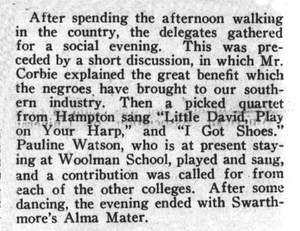Polity Club Holds Conference to Discuss Negro-White Problem
Dublin Core
Title
Subject
Description
Publisher
Date
Contributor
Rights
Language
Type
Identifier
Coverage
1924
Text Item Type Metadata
Text
POLITY CLUB HOLDS CONFERENCE TO DISCUSS NEGRO-WHITE PROBLEM
Colleges Send Delegates to Swarthmore for Study of Race Question
That negro students, possessing the necessary qualifications, should be admitted to Swarthmore upon application, was the verdict of one meeting of the Intercollegiate Conference on Negro-White Relationships, which was held April 11, 12 and 13. The conference took place at Woolman School, under the auspices of the Bryn Mawr Liberal Club, the University of Pennsylvania Forum, and the Swarthmore Polity Club, and was well attended by representatives from New York City College, Penn State, Union Theological Seminary and Hampton Institute, s [sic] well as the colleges mentioned above. It was entirely a student affair, the hostesses at Woolman School being the only outsiders.
Mary Rodney, of Bryn Mawr, opened the first meeting Friday night, with a report on the racial discussion at the Indianapolis convention. Oother [sic] speakers presented the history of the negro in America and his present status. A strong discussion followed, some students stressing the contributions of the negroes to our country, others declaring that they had merely assimilated American culture and had nothing of their own. It was agreed, however, that the only folklore we possess we owe to them. The question of racial inferiority also arose. Eminent scientists were quoted to prove both sides, and the progress of the race during the last fifty years ws [sic] thoroly [sic] discussed, but no conclusion was reached that night.
At 9.30 Saturday morning, the second meeting convened to consider the problem: Is racial discrimination warranted? Miss Rodney stated that Bryn Mawr was ready to admit any colored woman who might apply for entrance and could prove her qualifications. It was generally agreed that there is no reason for excluding negroes from our institutions except thru [sic] force of public opinion. Eugene Corbie told of the discrimination practiced against the blacks in the southern states, of the “Jim-Crow Cars” and the laws that make it practically impossible for a negro to vote. The problem of intermarriage was also discussed but was left an open question.
After spending the afternoon walking in the country, the delegates gathered for a social evening. This was preceded by a short discussion, in which Mr. Corbie explained the great benefit which the negroes have brought to our southern industry. Then a picked quartet from Hampton sang “Little David Play on Your Harp” and “I Got Shoes.” Pauline Watson, who is at present staying at Woolman School, played and sang, and a contribution was called for from each of the other colleges. After some dancing, the evening ended with Swarthmore’s Alma Matter.
Intermarriage Relations
The last meeting was held Sunday morning, the object being to find a solution of the problem. A long discussion of the intermarriage question ended in a unanimous resolution against the present intermarriage laws. “If white men understood.” said Mr. Corbie, “that the law would hold them responsible for the black women they compromise, they would let them alone.” It was finally decided that the conference itself could do little in this direction and that, as Mr. Brown, of Hampton, put it, “plain courtesy would go farthest toward educating public opinion.”
Throughout the conference there was much discussion of the relative intelligence and capacity of negroes and white men; and the question of whether a mixture of the races would result in better or worse citizens had its full share of the argument. The students also compared the morals of the two races, Mr. Corbie asserting that negroes are nonmoral rather than immoral.


